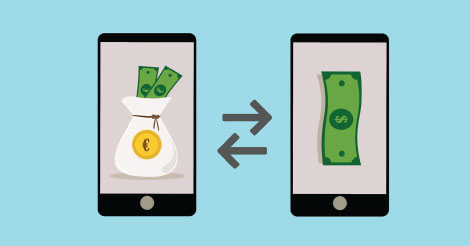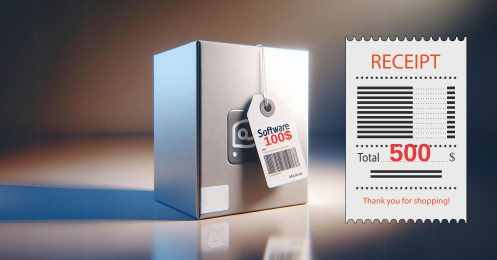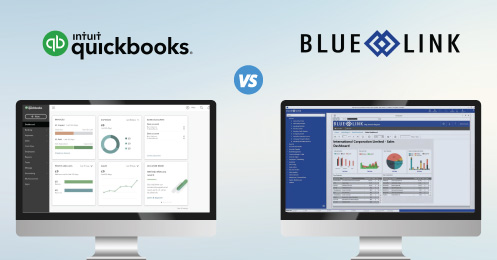Whether you’re paying rent for your warehouse or leading the implementation of new software for your business, one thing we all know for sure is that nothing is free. If you’re a business owner, you probably have to keep track of making payments to retailers, suppliers, vendors, and employees every single day. With so much money coming in and out of your accounts, it’s best to be aware of all your payment options. Although cash remains the most popular payment method for Americans, with 30% of all payments being made with physical money in 2017 it doesn’t make a whole lot of sense to pay for everything with cash. For example, if your company implements ERP software and you have to pay a monthly subscription fee, you will want to automate this process and track those payments to ensure they are completed on time. Explore the different electronic payment methods and discover what’s best for your business.
EFT Transfers
EFT stands for electronic funds transfer that moves money from one account to another electronically over a computerized network. To make an EFT payment, you must know the details of your recipients’ bank account information and once you authorize the transfer, the money will be taken from your account and deposited into the recipient’s account. You will have used EFT technology if you’ve sent money to a friend using an app on your smartphone or if you’ve used online banking to move money from your checking to your savings account.
Types of EFT Transfers:
- Direct Deposit (ACH)
- Wire Transfers
- Phone payments
- Mobile wallets
- Electronic Checks
- ATM Transactions
- Debit Card Transactions
- Internet Transactions or Computer Banking
Cost: Depends on the type of EFT transfer. For example, certain ATM transactions have a cost associated with them while other transactions may be free.
Processing Time: The EFT Transfer may take anywhere from one to four business days. Some electronic funds (e.g. wire transfers) are usually sent and received within the same day. Keep in mind that there may be certain cut-off times in place. For example, if you initiate a transfer after 7 pm, the transaction may only begin the next business day.
Limits: Depends on the type of EFT you’re transferring.
ACH Transfers
ACH transfers are electronic, bank-to-bank money transfers processed specifically through the Automated Clearing House (ACH) Network. It is important to note that an ACH transfer is a type of EFT transaction but not all EFT Transfers are ACH transactions (e.g. Wire transfers). There are two types of ACH money transfers that you may already be using. The first is to pay your staff through direct deposit which allows any business or government entity to deposit funds to a consumer. This includes paychecks, tax refunds, interest payments etc. You can also use ACH Transfers to send money to other individuals or businesses and organizations that you are paying a service for. The person (or company) sending the money will see an ACH debit in their bank account while the person (or company) receiving the money registers this as an ACH credit in their bank account.
Cost: Depending on where you bank, ACH Transfers are usually free. If they do charge a fee, it is often only just a few dollars.
Processing Time: You can expect the transaction to transfer the funds in one-two business days once initiated.
Limits: Many banks impose a limit either per transaction, or you may have daily, weekly or monthly limits. The bank may also impose limits on destinations, so it is a good idea to check with your bank before sending an international ACH Transfer.
Wire Transfers
A wire transfer is a type of EFT transfer done electronically across a network of banks or transfer agencies around the world. A wire transfer allows for the safest movement of money to people and financial institutions around the globe. The sender will first pay for the transaction at their bank and they will contact the recipients’ bank with payment instructions through a secure system such as SWIFT. The recipients’ bank will receive all the information and deposit its own reserve fund into the correct account. The two banks will then settle the payment on the back end after the money has been deposited. In some cases, a non-bank wire transfer company like Western Union does not require bank account numbers. Conveniently, their international money transfer service is available in over 200 countries.
Cost: Some providers charge anywhere from $15-$35 per transaction. International wire transfers can cost as much as $45.
Processing Time: A local wire transfer can be received within a few hours. International wire transfers can take as long as two business days to process.
Limits: There are no laws indicating a limit to the amount of money you can wire transfer, but some individual banks often cap the total amount.
Email Money Transfers (EMT)
Interac e-Transfer
Interac e-Transfer is provided by the Canadian company, Interac which is involved in creating interbank networks to facilitate financial transactions between banks. In order to send an Interac e-Transfer all you need is the recipients’ phone number or email. When you have sent the transfer, the recipient will receive a notification and deposit instructions. To access the funds, the recipient must answer a specific security question that is set by the sender. In some cases, a recipient can sign-up for auto-deposit which will eliminate the need to check your email and answer any security questions. Once the funds have been accessed, the sending bank or credit union communicates with the other institution to finalize the transfer through established and secure processes. There is no actual physical flow of cash – the actual money is transferred via existing bank fund transfer networks.
Cost: Generally, Interac e-Transfers can be completed at no additional charge.
Processing Time: When sending an Interac e-Transfer, as soon as the recipient accepts the money via email or text, the funds are deposited immediately.
Limits: Your Interac e-Transfer limit is based on your client card’s daily access limit set through your bank. In some cases, your limit can be temporarily increased.
PayPal
PayPal is an electronic company where customers can make an account on their platform and connect their credit card or checking account. While making an account, users transfer money from their bank into their PayPal account. Once the account is verified and proof of funds is confirmed, users can then send or receive funds to and from other PayPal accounts online or through the app using the recipients’ email or phone number that is associated with their account.
Cost: PayPal offers many different transaction options that range in price from free to 5%. A list of all options can be found here.
Processing Time: It can take 3-5 business days for your funds to be available for use in your account. When purchasing or sending funds, the transfer should take no longer than 30 mins.
Limits: There is a limit of $10,000 in a single transaction but you can increase it by linking your credit card and lifting the limit.
Based on the limiting factors, both Interac e-Transfer and PayPal may be better suited for personal use rather than business.










